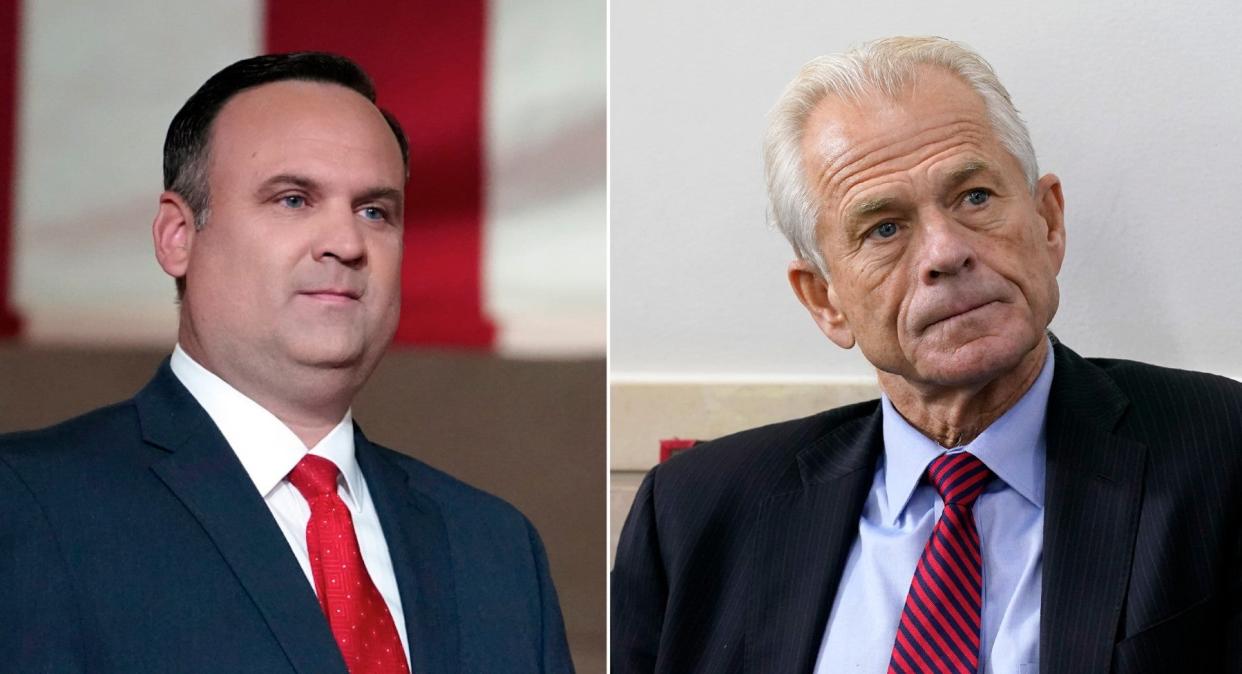House Jan. 6 panel makes contempt case against Scavino, Navarro

- Oops!Something went wrong.Please try again later.
- Oops!Something went wrong.Please try again later.
- Oops!Something went wrong.Please try again later.
- Oops!Something went wrong.Please try again later.
The House committee investigating the Jan. 6 attack on the Capitol made its case on Sunday to seek a contempt of Congress charge against two former Trump officials who have refused to cooperate with the panel.
The report, released ahead of a Monday vote by the panel, could ultimately lead to criminal charges for Dan Scavino, former President Trump's deputy chief of staff for communications, and Peter Navarro, a former trade adviser to Trump who waded into efforts to promote baseless claims of election fraud in the 2020 contest.
Both men, in addition to failing to appear before the committee, have not provided a single document requested by the panel, which largely targeted their communications.
Scavino - one of the very first people subpoenaed by the panel in September - apparently received six different extensions to the request, ultimately failing to appear for a Feb. 8 deposition.
"Despite all these extensions, to date, Mr. Scavino has not produced a single document, nor has he appeared for testimony," the committee wrote in its report.
Navarro also failed to appear for a March 2 deposition after rebuffing the committee.
"Mr. Navarro had a brief exchange with Select Committee staff after accepting service of the subpoena and also made public comments indicating that he would not appear or provide documents as required by the subpoena," the report states.
The report also offers new details about the struggle to serve Scavino, who could not initially be located by process servers. His subpoena was eventually accepted on his behalf days later by a staffer at Mar-a-Lago.
But the next month, Scavino's attorney questioned the validity of that subpoena, claiming it was not "properly served" - pushing the committee to issue a new one in November.
The committee faulted the attorney for raising the issue "following weeks of discussions" about Scavino's deposition.
The committee will vote on whether to accept the report Monday evening, after which it will be forwarded to the full House for a vote.
If passed by the House, the report is sent to the Department of Justice, which can choose whether to pursue charges.
The House has forward two cases to the Department of Justice so far; it is pursuing a case against one-time White House strategist Steve Bannon, but has not yet acted on the same recommendation for former Trump chief of staff Mark Meadows.
Bannon, whose trial is set for this summer, is facing up to two years in jail and a $200,000 fine.
Attorneys for Scavino and Navarro have suggested they should be exempt from the committee's inquiry due to executive privilege concerns by Trump.
Trump has never formally asserted that privilege and lost a court battle seeking to prevent the National Archives from turning over his records to the panel.
President Biden has likewise waived executive privilege over the tranche of documents.
The newly unsealed subpoena to Scavino asks him to turn over any communications dealing with the planning or marketing of the Jan. 6 rally, including those with Trump or his family members.
It also asks for outtakes of the video Trump made telling his supporters to go home.
"Mr. Scavino's promotion of the January 6th events, his reported participation in multiple conversations about challenging the election, and his reported presence with then-President Trump as the attack unfolded and in its aftermath make his testimony essential to fully understanding the events of January 6th, including Presidential activities and responses that day," the report states.
Navarro's subpoena asks him about any communication with Rudy Giuliani and others on Trump's legal team.
It also asks about his involvement alongside Bannon to "develop and implement a plan to delay Congress's certification of, and ultimately change the outcome of, the November 2020 election."
Finally, it asks about details of a plan shared in his book, as well as in a three-part series on his website, dubbed the Navarro Report, in which he claimed the 2020 election suffered from irregularities.
While Navarro claims his testimony should be covered by executive privilege, the committee said he has "put forward no evidence to support a valid assertion of executive privilege."
But such a claim matters little to the committee, given what they argue was a campaign that extended well beyond his White House role as a trade advisor.
"The Select Committee does not seek documents or testimony from Mr. Navarro related to his official duties as a Federal official. None of the official responsibilities of Mr. Navarro's positions included advising President Trump about the 2020 Presidential election or the roles and responsibilities of Congress and the Vice President during the January 6, 2021, joint session of Congress," they wrote.
"Nor did those official duties involve researching or promoting claims of election fraud."
An attorney for Scavino declined to comment.
In a late Sunday statement, Navarro said the committee should try to "clarify this matter with President Trump" on his own executive privilege claims.
"The Select Committee's witch hunt is predicated on the Big Lie legal premise of a partisan Appeals Court that Joe Biden can waive Donald Trump's Executive Privilege. The Supreme Court will have none of that when the time comes - as it surely will -- and the DOJ knows such nonsense would gut Executive Privilege and the critical role it plays in effective presidential decision making," Navarro wrote.
Updated: March 28 at 8:23 a.m.

